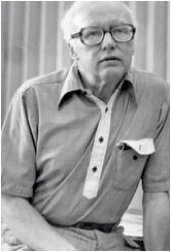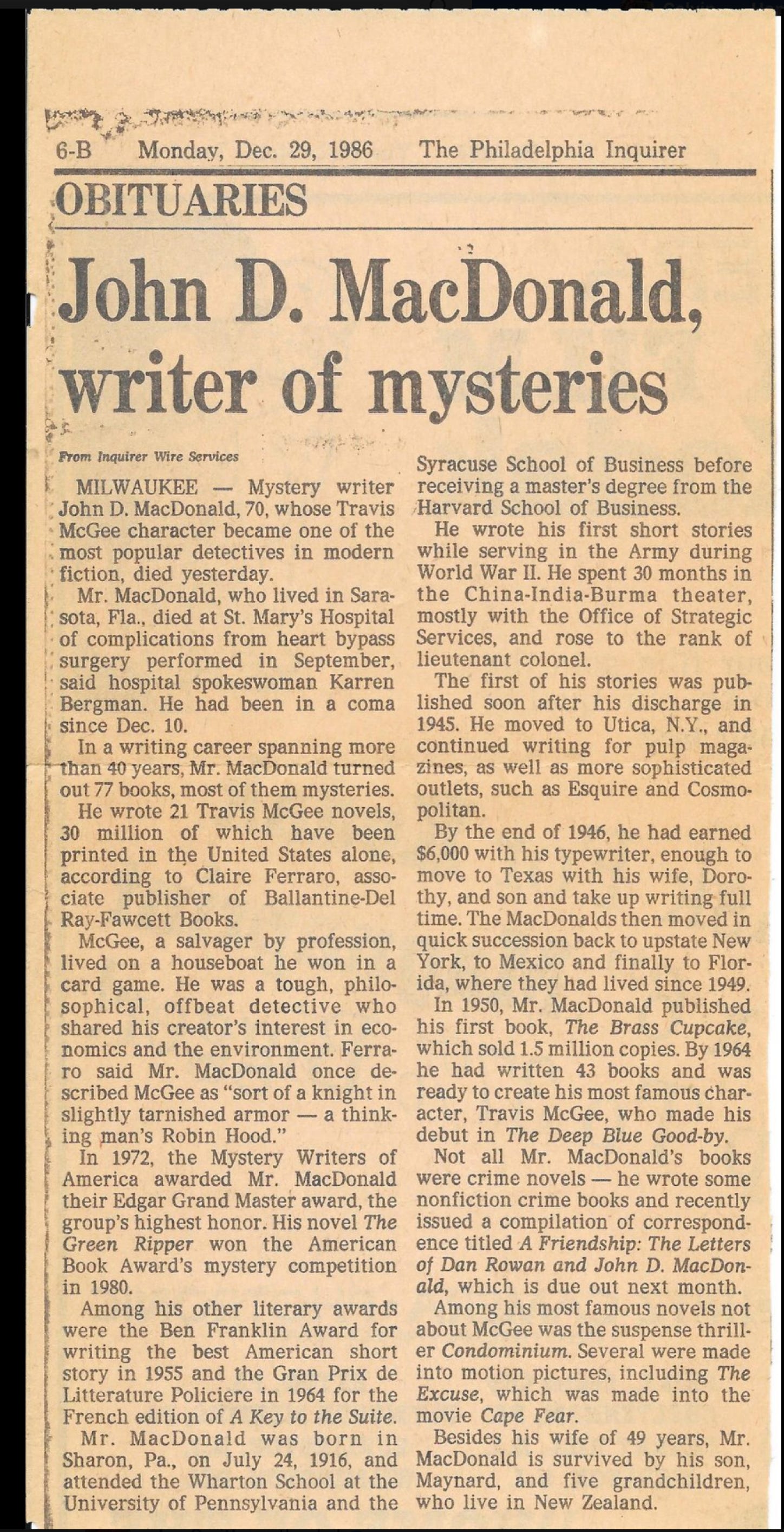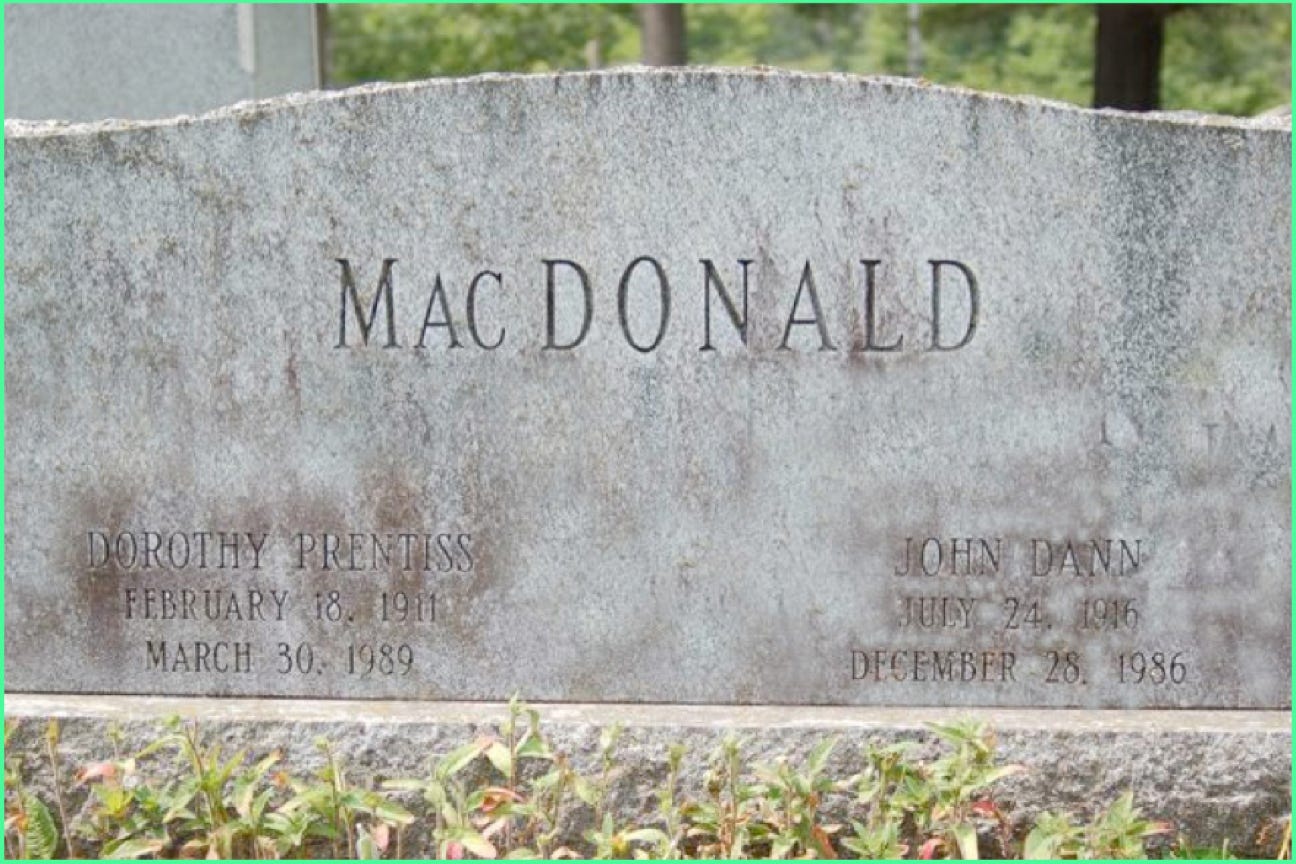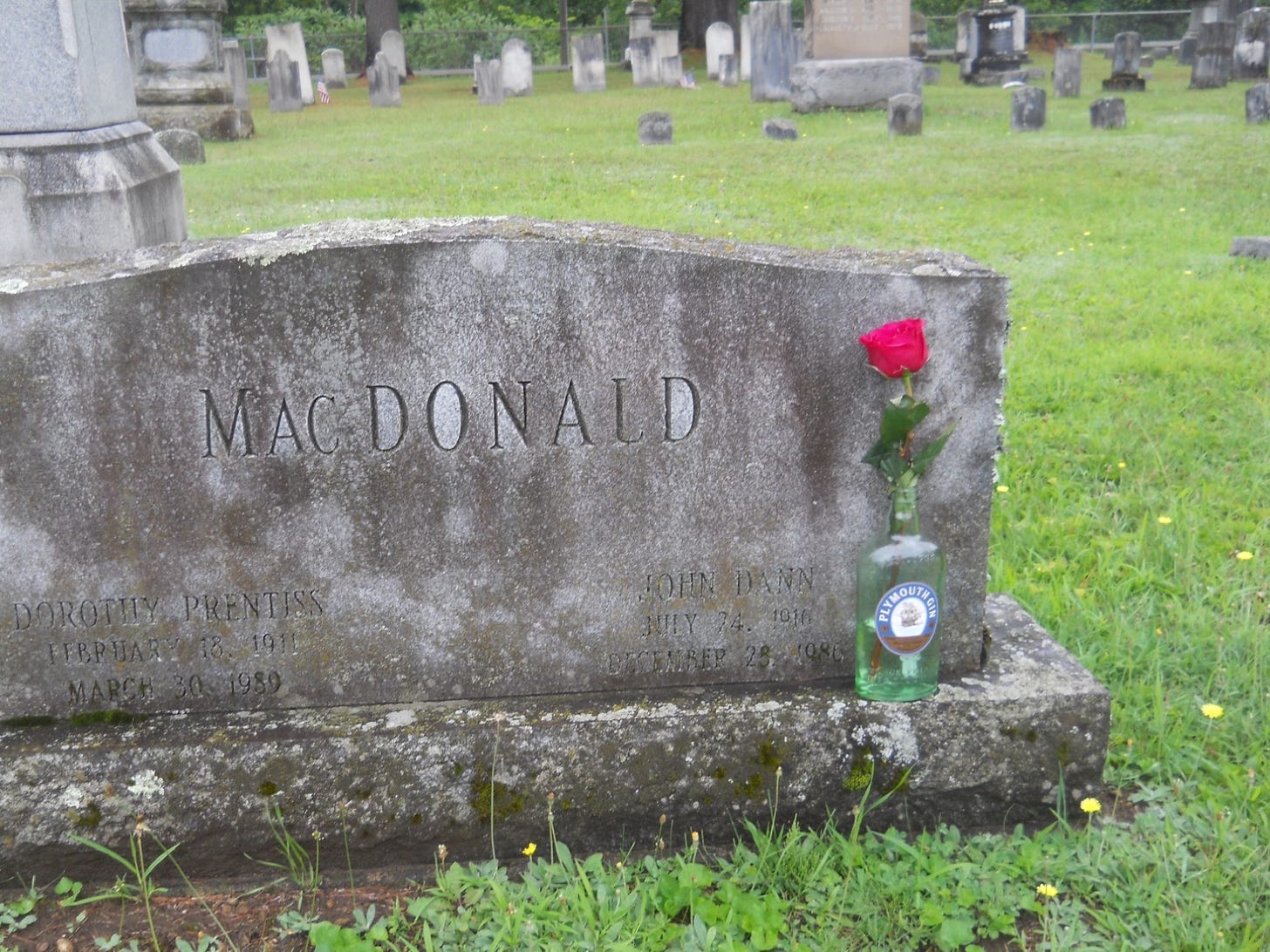OBITUARIES & GRAVESTONES
from Sarasota Magazine:

Few of us realized it, but that million-dollar listing was a sign thatthe Sarasota we knew was about to disappear forever.
What was it like, that old Sarasota? Fortunately, we had a great writer who explained it to us. And if the death of John D. MacDonald in 1986 marked the end of the old Sarasota, it also laid out the parameters of the city’s soul, and that has never changed.
MacDonald was a best-selling mystery novelist, the guy who invented the Travis McGee series. He was an astute observer of human nature, the good and the bad, and working from what he saw every day in Sarasota, he created a universal world that rings true with readers, generation after generation.
It’s a beautiful world, but a fragile one, and it has to be protected. Protection was the key theme of MacDonald’s work—brave men protect weaker men, men protect women, and all good people protect the environment. Protection is needed because evil exists, and its most prominent marker is greed and power-seeking.
Aside from his skill as a writer and his pre-eminence as one of the founders of the ecology movement, MacDonald was the ultimate Sarasotan. He was fiercely intelligent, at the top of his profession, a smart businessman, active in the community, a loyal and generous friend. He lived in a big house on Big Pass; it was designed to function without air-conditioning yet also withstand 100-mile-an-hour winds. His wife, Dorothy, was a painter, and they were active in the creation of New College. But as congenial as MacDonald was, there was always that reserve that great artists have, that self-imposed distance from the rest of humanity.
*********
JOHN D. MACDONALD, NOVELIST, IS DEAD
N.Y. TIMES
By C. GERALD FRASER
Published: December 29, 1986
John D. MacDonald, the novelist whose best-selling mysteries sold millions of copies, died yesterday at St. Mary's Hospital in Milwaukee of complications from heart surgery. He was 70 years old and lived in Sarasota, Fla.
Claire Ferraro, associate publisher at Ballantine/Del Rey and Fawcett, said Mr. MacDonald underwent bypass surgery in September and had been in a coma since Dec. 10 .
From a modest beginning in 1946 with the sale of a short story for $25, Mr. MacDonald's writing career blossomed to produce about 70 books. Of those, 21 made up the highly successful Travis McGee series - about the adventures of a tough, cynical, philosophical knight-errant living on a houseboat in Florida.
Three-quarters of his books were originally published as paperbacks. His prodigious literary output also included 500 short stories.
In 1972 he won the Mystery Writers of America's Grand Master Award. In 1980 he won the American Book Award for his hard-cover mystery ''The Green Ripper.'' In 1955 he won the Ben Franklin Award for the best American short story, and in 1964 he received the Grand Prix de Litterature Policiere for the French edition of ''A Key to the Suite.'' The Resort Life
Robin W. Winks, a professor of history at Yale University, said last year in The New York Times Book Review that ''Mr. MacDonald's books are always about boats, and hot sun, and the putative glamour of resort life, as much as they are about the persistence of evil and the near-randomness of honesty.''
The Travis McGee series began in 1964 with the first appearance of McGee - a 6-foot-4, 212-pound thinking man's Robin Hood - in ''The Deep Blue Good-By.'' Four other books were published within a year. Since then all the Travis McGee novels have made best-seller lists, and some have been No. 1.
Mr. MacDonald gave each Travis McGee novel a title that included a color, such as ''Bright Orange for a Shroud,'' ''Darker Than Amber,'' ''A Deadly Shade of Gold,'' ''Dress Her in Indigo,'' ''The Girl in the Plain Brown Wrapper,'' ''The Green Ripper'' and ''The Long Lavendar Look.''
Although mysteries were his metier, Mr. MacDonald published other works, including ''Condominimum,'' a 1977 best-selling novel about greedy developers of substandard apartment complexes in Florida; a nonfiction work, ''No Deadly Drug,'' about the trial of Dr. Carl A. Coppolino, a New Jersey doctor convicted of killing his wife, and ''Nothing Can Go Wrong,'' a book about a cruise that he wrote with Capt. John J. Kilpack. A Book of Letters
Mr. MacDonald's final work - a nonfiction book, ''A Friendship: The Letters of Dan Rowan and John Dann MacDonald,'' on the correspondence between the comic and the author - is to be published next month by Knopf.
In describing his fiction, Mr. MacDonald said in a 1970 interview with The Washington Post that ''most of my published novels are of the folk dancing category, the steps, the patterns traditionally imperative, the retributions obligatory.''
''Within these limits I have struggled for freshness, for what insights I can muster, for validity of characterization and motivation, for the accuracies of method and environment which enhance any illusion of reality,'' he said.
During most of his career, Mr. MacDonald wrote daily, for seven to nine hours, with a break for lunch and another at the cocktail hour. He used expensive bond paper, explaining: ''I think the same situation is involved as painting and sculpture. If you use the best materials you can afford, somehow you have more respect for what you do with it.''
He said he rewrote ''by throwing away a page, a chapter, half a book -or go right back to the beginning and start again.'' 'Like an Easter Egg Hunt'
''I enjoy the hell out of writing because it's like an Easter egg hunt,'' he once said. ''Here's 50 pages, and you say, 'Oh, Christ, where is it?' Then on the 51st page, it'll work. Just the way you wanted it to, a little better than anything in that same area ever worked before. You say: 'Wow! This is worth the price of admission.' ''
Suspense writing was ''like a mental exercise'' for Mr. MacDonald. ''Once you accept the limits of what you're doing, you try to do the best within those limits,'' he said.
Mr. MacDondald was born in Sharon, Pa., on July 24, 1916. He was graduated from Syracuse University in 1938 and received an M.B.A. from the Harvard Graduate School of Business Administration in 1939.
Despite this background he was dismissed from jobs in an investment house and an insurance company because, he said, he mistakenly thought ''they wanted to hear my ideas.''
Rather than take a third job he joined the Army and became a second lieutenant. After about two years in the United States, he was sent to the China-Burma-India theater as a member of the Office of Strategic Services. ''Not the cloak and dagger O.S.S.,'' he once explained. ''In the keeping in touch with operational units behind the lines, I never got into a tough war, though there were times when a few shots were fired in anger, remarkably few.'' He was discharged as a lieutenant colonel.
Frustrated while overseas by Army censors who cut up many of his letters home, he wrote a short story and sent it to his wife. who sold it for him. At the war's end he was being published in pulp magazines as well as in Liberty, Esquire and Cosmopolitan.
Mr. MacDonald is survived by his wife, Dorothy; a son, Maynard, of New Zealand, and five grandchildren..
************
The Washington Post reported that John MacDonald was dead at seventy the other day. Three score and ten may be the biblical span of a man's years, but it was not long enough for MacDonald. The good don't always die young, but their deaths are always causes for mourning no matter what the age, and so it is with John. He began his career in the penny a word pulps of the forties. Then, he wrote science fiction, mysteries, whatever would bring home a dollar. The quality of his yeoman work earned him entrance to the slicks, Colliers and The Saturday Evening Post. Like any author eager to make the long jump from beans to hamburgers, he jumped at his new markets and never looked back. From there, he made the difficult transition from short fiction to novels. Although he was extremely successful and prolific, most of his work in the fifties and early sixties, including his two science fiction novels, Ballroom of the Skies and Wine of the Dreamers and his one fantasy novel, The Girl, the Gold Watch and Everything have been, for the most part, forgotten. They were good enough to be successful, not good enough to stand out from the many other science fiction and fantasy tales of thirty years ago.
Then, in 1964, he wrote a novel called The Deep Blue Good-by in which he introduced a man named Travis McGee who lived on a houseboat, the Busted Flush, at Bahia Mar, Fort Lauderdale, Florida. Travis was in the salvage business, for half of whatever it was worth to you, he'd go out and reclaim what you had lost. McGee found this business proposal lucrative enough, half a loaf being better than none, that MacDonald was able to find enough material for 21 novels of his adventures. Books which took John from hamburgers to steaks and a measure of fame.
Longevity is no sign of quality in the book business, series with names like Mutant Vietnam Veterans From Hell keep the 2nd line publishing houses in business after all. The Travis McGee books have nothing in common with these though. McGee is as tough a hero as ever was found in the adventure/thriller racks, but although his origins may have been in the base dirt of many another serial hero, he rose above his field to join the exalted company of Nero Wolfe and Sherlock Holmes. Travis is that rare fictional tough man with a realistic human side. How many other fictional sleuths do we see working off the pounds of idleness? McGee's like to be the he man of adventure fiction, but he's all too mortal. He's sentimental and moody, a sucker for homeless kittens and lost causes. As he often laments, he continues to put on his rusty armour, pick up his battered lance and go jousting with dragons, even when it is clear that the dragon population keeps growing from year to year. We become cynics as we grow older all too often, and the stainless heroes which entertained us in our younger days lose their attraction, but there is still something in us which thrills to the image of someone trying to defend the right. In MacDonald's hands, McGee was a hero living in a world, all too recognizable our own, striving to uplift the down trodden and protect the helpless. McGee doesn't always succeed, and all too often it feels as if he's lost more than he gains, but the effort is made and reader comes away caring far more than for any mere cardboard character. After all, these days its hard to find nobility anywhere, and if its found between the pages of a paperback novel then perhaps it's only slightly less valuable than in the real world. As for me, I'll take my heroes where I find them, even in the humid, worn byways of an overdeveloped Florida. Where evil doesn't wear the designer faces of Miami Vice and McGee stands with friends against the petty, but deadly schemes of real estate sharks and small town hoodlums. If you'd like to meet Travis, I'd recommend The Empty Copper Sea, Darker Than Amber, or The Girl in the Plain Brown Wrapper. You've already met his world.
I'd like to have met John, but I'll not have the chance now. One hopes though that somewhere beyond this earth of ours, there's a boat slip in a Ft. Lauderdale, free of students on spring break and venal condominium builders, where a party's being held for a creator and his creation, hosted by the greater author of all.
Steven J. Vaughan-Nichols
The Washington Post reported that John MacDonald was dead at seventy the other day. Three score and ten may be the biblical span of a man's years, but it was not long enough for MacDonald. The good don't always die young, but their deaths are always causes for mourning no matter what the age, and so it is with John. He began his career in the penny a word pulps of the forties. Then, he wrote science fiction, mysteries, whatever would bring home a dollar. The quality of his yeoman work earned him entrance to the slicks, Colliers and The Saturday Evening Post. Like any author eager to make the long jump from beans to hamburgers, he jumped at his new markets and never looked back. From there, he made the difficult transition from short fiction to novels. Although he was extremely successful and prolific, most of his work in the fifties and early sixties, including his two science fiction novels, Ballroom of the Skies and Wine of the Dreamers and his one fantasy novel, The Girl, the Gold Watch and Everything have been, for the most part, forgotten. They were good enough to be successful, not good enough to stand out from the many other science fiction and fantasy tales of thirty years ago.
Then, in 1964, he wrote a novel called The Deep Blue Good-by in which he introduced a man named Travis McGee who lived on a houseboat, the Busted Flush, at Bahia Mar, Fort Lauderdale, Florida. Travis was in the salvage business, for half of whatever it was worth to you, he'd go out and reclaim what you had lost. McGee found this business proposal lucrative enough, half a loaf being better than none, that MacDonald was able to find enough material for 21 novels of his adventures. Books which took John from hamburgers to steaks and a measure of fame.
Longevity is no sign of quality in the book business, series with names like Mutant Vietnam Veterans From Hell keep the 2nd line publishing houses in business after all. The Travis McGee books have nothing in common with these though. McGee is as tough a hero as ever was found in the adventure/thriller racks, but although his origins may have been in the base dirt of many another serial hero, he rose above his field to join the exalted company of Nero Wolfe and Sherlock Holmes. Travis is that rare fictional tough man with a realistic human side. How many other fictional sleuths do we see working off the pounds of idleness? McGee's like to be the he man of adventure fiction, but he's all too mortal. He's sentimental and moody, a sucker for homeless kittens and lost causes. As he often laments, he continues to put on his rusty armour, pick up his battered lance and go jousting with dragons, even when it is clear that the dragon population keeps growing from year to year. We become cynics as we grow older all too often, and the stainless heroes which entertained us in our younger days lose their attraction, but there is still something in us which thrills to the image of someone trying to defend the right. In MacDonald's hands, McGee was a hero living in a world, all too recognizable our own, striving to uplift the down trodden and protect the helpless. McGee doesn't always succeed, and all too often it feels as if he's lost more than he gains, but the effort is made and reader comes away caring far more than for any mere cardboard character. After all, these days its hard to find nobility anywhere, and if its found between the pages of a paperback novel then perhaps it's only slightly less valuable than in the real world. As for me, I'll take my heroes where I find them, even in the humid, worn byways of an overdeveloped Florida. Where evil doesn't wear the designer faces of Miami Vice and McGee stands with friends against the petty, but deadly schemes of real estate sharks and small town hoodlums. If you'd like to meet Travis, I'd recommend The Empty Copper Sea, Darker Than Amber, or The Girl in the Plain Brown Wrapper. You've already met his world.
I'd like to have met John, but I'll not have the chance now. One hopes though that somewhere beyond this earth of ours, there's a boat slip in a Ft. Lauderdale, free of students on spring break and venal condominium builders, where a party's being held for a creator and his creation, hosted by the greater author of all.
Steven J. Vaughan-Nichols
****************

***********************************************************************************************************************

John D. MacDonald and Dorothy Prentiss MacDonald’s gravestone, located in Poland, N.Y. , about 28 miles from Piseco Lake where they spent many summers. The name of the cemetery is Pine Grove. (BTW the Find A Grave site does not list JDM as famous, but does list a dead Republican from the early 1900's--go figure)
(The stone surface is in need of cleaning; I have used Photo Elements to make the inscriptions clearer.)
*******************************************************************************
Hi Cal,
With the death of the Baltimore Poe Toaster tradition, I thought that it might be appropriate to start a similar tradition in JDM's memory. I know that I have missed his birthday by a couple
od weeks, but nonetheless I plan to leave a bottle of Plymouth Gin and a Scarlet rose at his grave in Poland NY tomorrow on my way to an Adirondack hike. I will also be traveling northeast along rte 8 that you may remember from the Quick Red Fox when Travis is in pursuit of the ski lodge where Austrian instructor Appel is employed.
Regards,
Mike Friery

© bill 2014